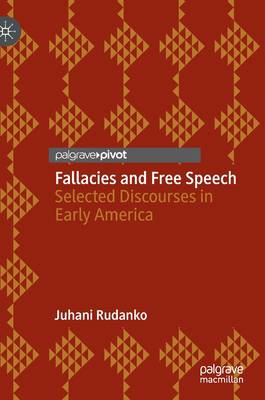
Door een staking bij bpost kan je online bestelling op dit moment iets langer onderweg zijn dan voorzien. Dringend iets nodig? Onze winkels ontvangen jou met open armen!
- Afhalen na 1 uur in een winkel met voorraad
- Gratis thuislevering in België vanaf € 30
- Ruim aanbod met 7 miljoen producten
Door een staking bij bpost kan je online bestelling op dit moment iets langer onderweg zijn dan voorzien. Dringend iets nodig? Onze winkels ontvangen jou met open armen!
- Afhalen na 1 uur in een winkel met voorraad
- Gratis thuislevering in België vanaf € 30
- Ruim aanbod met 7 miljoen producten
Zoeken
€ 63,45
+ 126 punten
Omschrijving
This book offers a new perspective on selected discourses and texts bearing on the evolution of a distinctively American tradition of free speech. The author's approach privileges fallacy theory, especially the fallacy of ad socordiam, in a key Congressional debate in 1789 and other forms of verbal manipulation in newspaper editorials during the War of 1812. He argues that in order to understand James Madison's role in the evolution of a broad conception of freedom of speech, it is imperative to examine the nature of the verbal attacks targeted at him. These attacks are documented, analyzed with the concept of aggravated impoliteness, and used to demonstrate that it was Madison's toleration of criticism, even in wartime, that provided a foundation for a broad conception of freedom of speech. This book will be of interest to both scholars and lay readers with an interest in the application of discourse analysis and historical pragmatics to political debates, argumentation theoryand fallacy theory, and the evolution of the concept of freedom of speech in the early years of the United States.
Specificaties
Betrokkenen
- Auteur(s):
- Uitgeverij:
Inhoud
- Aantal bladzijden:
- 134
- Taal:
- Engels
Eigenschappen
- Productcode (EAN):
- 9783030678760
- Verschijningsdatum:
- 2/04/2021
- Uitvoering:
- Hardcover
- Formaat:
- Genaaid
- Afmetingen:
- 196 mm x 218 mm
- Gewicht:
- 272 g

Alleen bij Standaard Boekhandel
+ 126 punten op je klantenkaart van Standaard Boekhandel
Beoordelingen
We publiceren alleen reviews die voldoen aan de voorwaarden voor reviews. Bekijk onze voorwaarden voor reviews.











